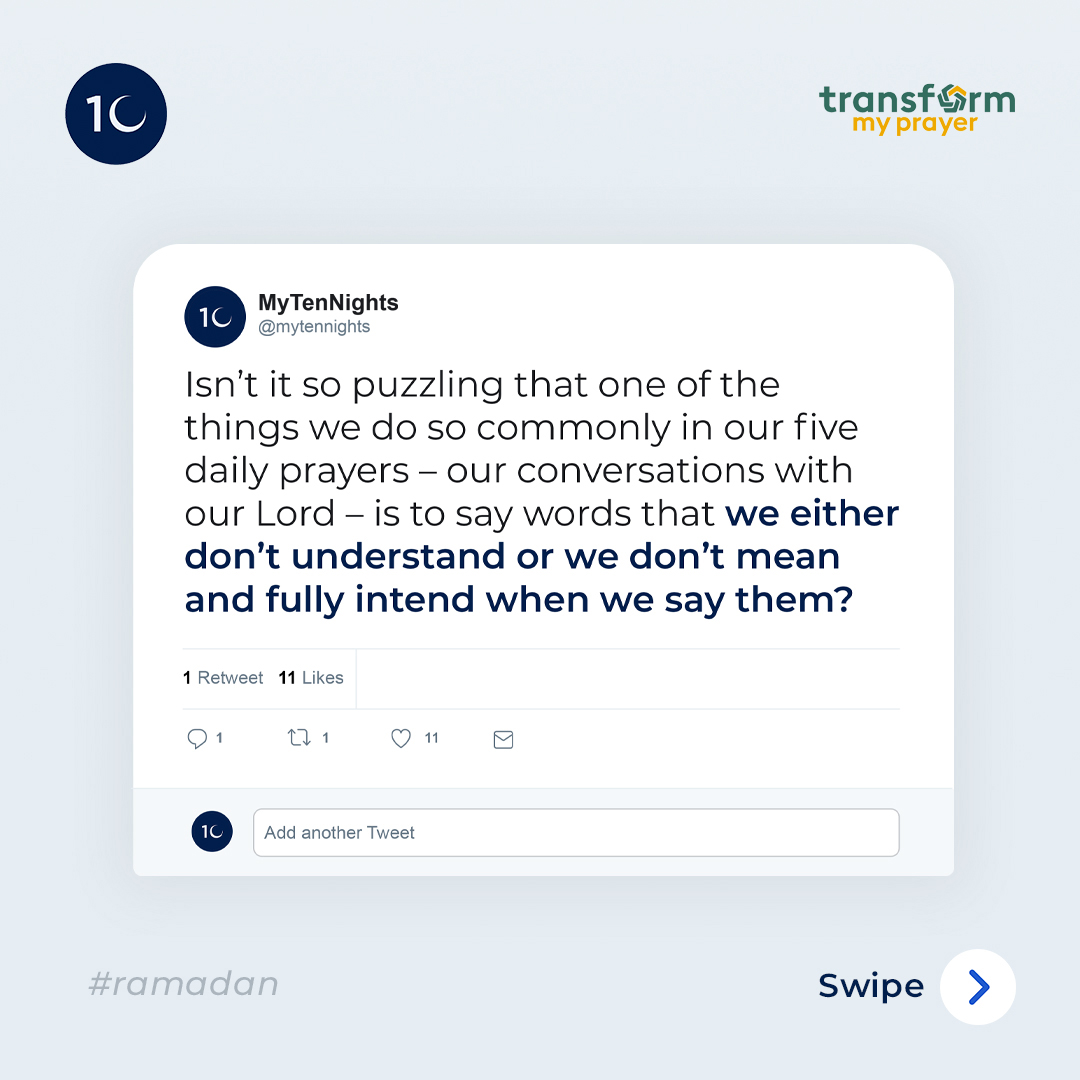Assalamu-alaikum. Peace be upon you.
What we think matters. What we intend matters. What we say matters. What we do matters.
Beware the meaningless prayer!
Isn’t it so puzzling that one of the things we do so commonly in our prayers – our conversations with our Lord – is to say words that we either don’t understand or we don’t mean and fully intend when we say them?
We believe that we are standing before God, that we are addressing Him, that He hears and can respond to us. But the way we rattle through our words without them coming from our hearts would suggest that we’re in two minds about whether He’s there at all!
After all, there is no other context in life in which we would recite words from memory to someone else in an unfamiliar language which we don’t understand. Even if we found ourselves in the odd position of doing so, we wouldn’t claim that it was a meaningful experience, that we conveyed anything to the other person from deep within ourselves.
Our task is to infuse the prescribed statements in our prayers with substance and really make them our own. Please realise that there is a huge difference between knowing that Allahu Akbar means ‘God is greater’ and saying Allahu Akbar in our prayers as if we really believe and feel that God is greater! Just as with any other verbal communication, our tone and emphasis will give away the extent to which we are relating to the words that we say.
Overcoming mindless and monotonous communication in prayer isn’t easy, but it is possible. Here are three steps you can follow:
1. Take time outside the prayer to memorise the meanings of the words you say in prayer.
2. Pace yourself appropriately in prayer, saying one phrase at a time, slowly and clearly.
3. Whilst saying the words, and in between each phrase, give yourself a chance to process the meanings in your mind and intend them from your heart.
No meaning, no guidance.
Although it feels as though it’s started to change in positive ways, I’m sure we’re all familiar with the culture in which the accurate recitation, memorisation and beautiful expression of the Qur’an are prioritised over learning Arabic, reading a translation and pondering the actual messages in revelation.
Some years ago, I was sent the translation of an Urdu poem lamenting our attitude to the Qur’an:
Ramadan is coming up. It’s the month of revelation. Make the intention now that, wherever you are in terms of your Qur’anic reading habit, you’re going to step up your efforts to further familiarise yourself with the actual meanings and messages in the Book. Remember, it’s a book of guidance and you can’t be guided by what you don’t understand.
Many people think that there’s something wrong or problematic in reading a translation of the Qur’an regularly. If anything, for many of us, it’s exactly what we need to prioritise!
To lead is to seek and share what is meaningful
My favourite secular definition of a leader is one proposed by John Maxwell, who says, “A leader is one who knows the way, goes the way and shows the way.” A lot is packed into this short and memorable quote if you allow yourself some time to reflect on it.
My adapted, God-centred version of this statement – which captures what it means to be a leader as far as we as believers are concerned – is as follows, “A real leader is one who knows, goes and shows the way to God.”
Notice that the first of the three components is knowledge. You can’t lead anyone else to a destination if you have no idea how to get there yourself!
Knowledge is absolutely vital if we are serious about becoming people who not only journey to God ourselves, but attempt to facilitate that journey for others. And what is the worthy acquisition of knowledge except for a search for truth, for what things actually mean, for what really matters?
Always try to go beneath the surface. Let your own learning journey be full of curiosity. Ask good questions of yourself and others. Seek to understand deeply what God wants from you in your context. Then find creative ways to share your understanding with others you hope to influence in a way that constitutes a deeply meaningful message.
Then, and only then, might we start to become effective leaders that people so badly need.
P.S. Don’t forget to download ‘The Secret Seven’ eBook. Far too often, discussions on prayer focus disproportionately on the outward aspects and technicalities. But what matters most of all is praying with presence of heart and mind. This eBook will help you do just that, God willing.
